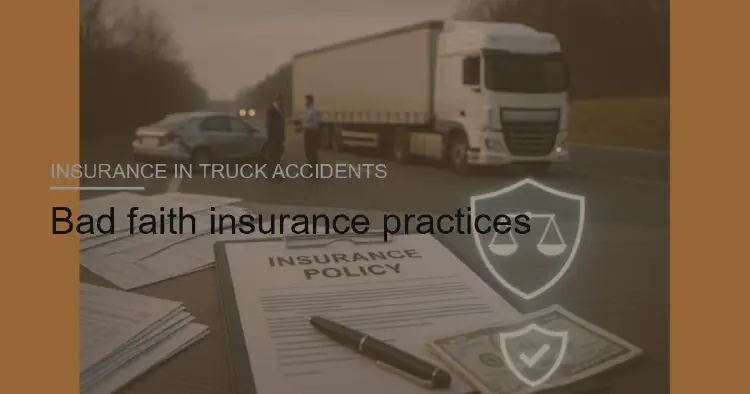Bad faith insurance practices
Insurance companies owe a duty of good faith and fair dealing when handling claims. When they deliberately act unfairly, delay payments, or deny valid claims, they may be guilty of bad faith practices.
- Truck Accident Law Team
- 2 min read
Article 6 of 6 in Insurance in Truck Accidents/

Bad Faith Insurance Practices in Truck Accident Cases
What Is Bad Faith?
- Occurs when an insurer fails to honor its legal obligations to policyholders or claimants.
- Goes beyond simple mistakes—it involves intentional or reckless disregard for fair claim handling.
Common Examples of Bad Faith
- Unreasonable Denial of Claims
- Rejecting valid claims without justification.
- Deliberate Delays
- Stalling investigations or payment to pressure victims into settling for less.
- Lowball Settlement Offers
- Offering compensation far below the claim’s true value despite clear evidence.
- Failure to Investigate Properly
- Ignoring medical records, accident reports, or key evidence.
- Misrepresenting Policy Terms
- Twisting or hiding contract language to avoid paying.
- Refusal to Defend Policyholders
- Failing to provide legal defense when required under liability coverage.
Legal Remedies for Victims
- Victims (or insured trucking companies) may file a bad faith lawsuit against the insurer.
- Possible damages include:
- Compensatory damages (unpaid claim amounts).
- Consequential damages (losses caused by delay).
- Punitive damages for intentional misconduct.
- Attorney’s fees and court costs in some jurisdictions.
Why It Matters in Truck Accident Cases
- Trucking policies often involve millions in coverage.
- Bad faith conduct can significantly harm victims by delaying needed medical care or financial recovery.
- Courts take such conduct seriously, and proving bad faith can substantially increase recoverable damages.
Summary: Bad faith insurance practices occur when insurers intentionally mishandle claims, leaving victims without rightful compensation. Recognizing these tactics empowers victims and attorneys to pursue not only fair settlements but also additional damages for insurer misconduct.
You might also like:
- Tags:
- Trucking Companies
- Punitive Damages
- Medical Records
- Bad Faith
- Liability Coverage
- Settlement Offers
- Key Evidence
- Compensatory Damages
- Cases Trucking
- Faith Insurance
- Insurance Practices
- Bad Faith Insurance
- Faith Insurance Practices
- Accident Cases Trucking
- Include Compensatory Damages
- Lowball Settlement Offers